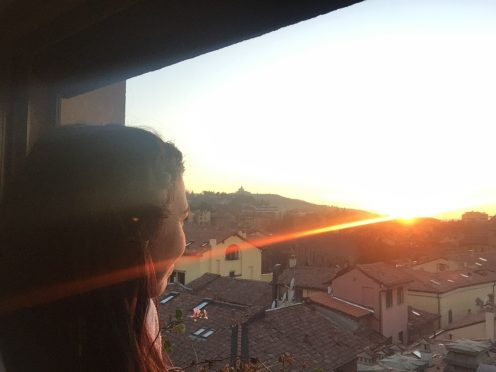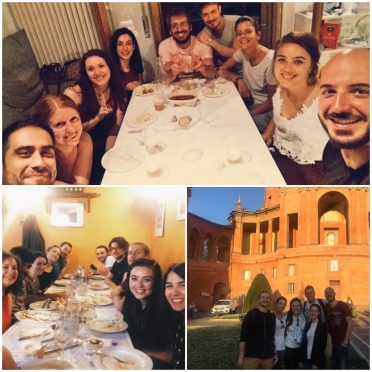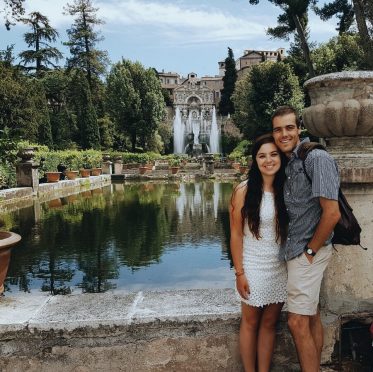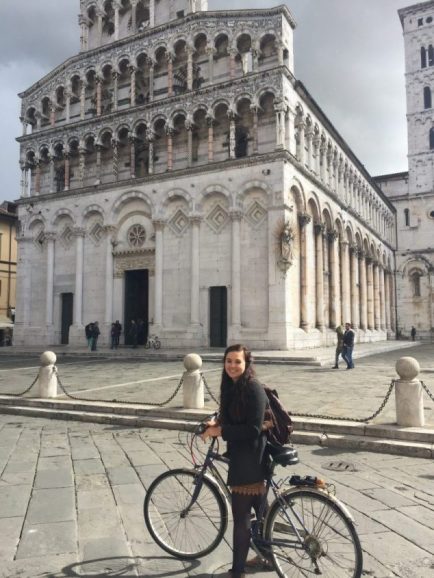Pre-departure:
For me the semester abroad meant much more than just an exchange. Living abroad, specifically Italy, has been something I thought about often but I never dared to explore the possibility. However, I knew that I would one-day regret not pursuing this dream. So, for about a year and a half before my exchange I started studying Italian, simply because I liked the language and the Italian way of life and I had a hope to perhaps have a use for it someday. Little did I know that an adventure of a lifetime was waiting for me…
After applying for the semester exchange program at the Stellenbosch University International, I also applied for numerous other bursaries, specifically the MAECI bursary, which is a bursary offered by the Italian government to foreign students. This bursary really made life much easier for me, it literally covered my entire exchange (accommodation, food, visa, health insurance etc.) except the flight tickets, but that was cover by SU International.
Visa Application:
My VISA application went smoothly, since my bursary was administrated by the Italian embassy in South Africa, they were already informed of me before I applied for the VISA. The only thing that needed a bit of creativity was the “proof of accommodation”, since I did not have that sorted by the time I applied for the VISA.
*TIP for all future VISA applicants – book temporary accommodation at a hostel or cheap hotel in the city of your exchange for the entire duration of your exchange on booking.com, but make sure you can cancel it for free (there’s an option to only search for that). Just make sure you know up until what date the cancellation will be free!!
Accommodation Search:
If you are planning to go to Bologna, spoiler-alert here!! Searching for accommodation in Bologna is really a thriller… However, it’s 100% worth it in the end. I spent hours searching online for accommodation before I went. Then finally, I found the apartment on www.attico.it. Very excited about the beautiful ideally located apartment, I finally received a reply after the dozens of responseless emails. The “owner” confirmed that those dates suited him and said he’ll just list his apartment on Airbnb so that the payments can be done safely for both of us. When he sent me the link to “Airbnb listing” from where the deposit and first month’s rent was to be paid, I suspected something was weird because I couldn’t find the listing on Airbnb by myself, only on the link he sent me. Then I e-mailed the Airbnb help services and questioned the listing. The entire thing ended up being a scam!!! Luckily I detected it before I paid the money… He created an entire fake Airbnb website to set me up. So in desperation I signed up on Erasmus.su, paid the subscription, sent more e-mails and got setup by yet another scam that I also detected by chance before paying.
Eventually I just booked 10 days of Airbnb accommodation in Bologna and hoped to find accommodation in those 10 days.
Experience at the University of Bologna:

Italy is B-E-A-U-T-I-F-U-L!!! This was my first Italian sunset and the Bolognian air made it extravagant with the tiled-roofs changing colour by the minute and the church-bells echoing in the background. It was like the perfect ending to a hectic start. I was not accustomed to the European public transport before I went so that was a mission to figure out at first. Especially, since all the Italians I encountered on my first day could not speak English at all and I was quite clueless about the buses. So between missing my bus stops, getting lost with a heavy bag and forgetting all the Italian I’ve studied, it was overwhelming.
My 10 days of Airbnb accommodation became 3 (very expensive) weeks. Finding accommodation in Bologna was after all really a nightmare for all students, especially if you cannot sign a year contract, speak proper Italian or a have contact somewhere. The accommodation is really overpriced. After dozens of e-mails/messages, an Italian friend helping me out and lot of determination, I managed to get a very nice and reasonably cheap room. That was a miracle, may I just add. I stayed with an Italian girl and a Polish girl, both could speak Italian and English very well. That was a wonderful experience. They helped me with my Italian, introduced me to the Italian culture and of cause to Italian cooking.
The first few weeks of applying for a residence permit, opening a bank account etc. (basically become a temporary Italian-resident) was hard and less of a highlight than I imagined. My Italian was still a bit limited and most people can’t speak English, so the language barrier was difficult, even though I’ve studied Italian. But that basically sums up the hardest part of my exchange, from here it just went from highlight to highlight.
Research Experience:
I went abroad to perform research on my master’s project in mechanical engineering. My project involved chemical engineering so I was based at the chemical faculty and I had an office-space in the postgraduate office. The research facilities were very well equipped and my supervisors really went out of their way to give me the necessary guidance. The engineering faculty at Bologna is of a very high standard. Like Stellenbosch, they also have research groups that meet weekly. This was a wonderful opportunity to get feedback on my project from other students. I wouldn’t say the University of Stellenbosch is a single step behind. My experience was that on a postgraduate level, they are very similar. Most of the students in the office were PhD students – all Italians. Some of them could speak English very well, where in some cases I could speak better Italian than some could speak English. Every single lunch (1pm sharp) we all had together around the table in our office and afterwards we went for a cafe (expresso in SA terms). It’s true what they say about Italians and their food (and coffee). They only spoke Italian during that time so my Italian improved very quickly. I enjoyed seeing how I understood more and more as the months went by. They would gladly translate for me when I asked so it was like getting a free Italian lesson daily.

Living in Italy & Experiencing the Italian Culture:
From the start of my exchange, I decided to immerse myself totally in the Italian lifestyle. By that I mean I adapted to their eating habits (coffee and croissant for breakfast and pasta for lunch), getting around by bike and foot, spending evenings in the piazzas or parks, meeting for an “aperitivo” (order a drink at 7pm and get free snacks) with friends after work, enjoying the old buildings and not letting weather get in the way of a good gelato. I had a very nice group of Italian friends, we had a card-evening every 2 weeks, where someone had a chance to make food, which means that I had some REALLY good Italian food and lessons in how to cook Italian style. Italians are very warm people and they enjoy life. It was so nice to get to know Italy through their eyes too.
Travel Experience:
I used every opportunity to travel and explore Italy. The fresh markets, the monthly antique markets, the beauty and uniqueness of each town was enticing. I enjoyed the way all the Italians speak with so much passion and how proud they are of their “region”. Every single town or city I traveled to was breath-taking. The towns in Italy I traveled to included: Bologna (naturally), Lucca, Viareggio, Prato, Florence, Massa, Montepulciano, Pienza, San Quirico d’Orica, Monticchiello, Torri-del-Benaco, Venice, Verona, Rome, Tivoli, Cinque Terre, Amalfi, Salerno, Torino, Ancona and Naples. Then I also traveled to Finland, Croatia and France during my exchange.

Return to Stellenbosch:
Reflection:
Having been back in South Africa now for less than a month, I must say I really miss Italy. I am so grateful to have had such an experience that really changed my life. Looking back now, I really had opportunity to reflect on what matters in life, what is worth spending time on, what I want to achieve with my career and what the value of heartfelt friendships and family support are. Even though I loved the Italian lifestyle and the beauty on every street corner, I know South Africa is where I will always belong, despite all the difficulties our country faces. We don’t always realize that these difficulties in South Africa are where our opportunities lie. Being in a developing country, there’s still so much room for ideas and aspirations to grow, so much room for change, development and new culture to be established. This is something that is much harder in a developed country like Italy where the structures, rules and culture have been established centuries ago. I realized during this time that home is where your people are.
I will always go back to Italy and Europe with every opportunity that comes my way, but in the long run I believe my heart will stay on South African soil.
What I have learned:
- How the public transport system works.
- How to go about if you can’t find accommodation for weeks.
- Problem-solving
- People-skills
- Being independent
- Asking when in doubt
- That nothing is ever too impossible or too hard.
- Learning the importance of accommodating people no matter how different your cultures and beliefs are.
- Understanding how important it is to keep perspective in every situation.
- Traveling-in-Europe skills
- Finding-the-cheapest-_______- skills
- Speaking Italian (almost fluently)
- Living-the-moment skills
- Balancing work-travel-life
Tips for an exchange to Bologna:
- Embrace every single moment of your time abroad, it is really a one-in-a-lifetime and it does change your life. Travel with every opportunity.
- Save every penny before you go because traveling is expensive but SO worth it!! (And July/Aug SALES are amazing).
- Research how the transport system work before you go.
- Buy a cheap second-hand bicycle on Facebook with a proper lock.
- If you live far from campus, buy a monthly TPER bus ticket (27 euros), it works out cheapest.
- To travel to other cities in Italy, use TrenItalia Regionale, and travel early in the morning, it is waaaaay cheaper.
- Buy food at IN’S mercato or Lidl, it is the cheapest supermarkets.
- For any other necessities, go the weekly flee market close to the station, it’s huge and it has everything for very cheap. It’s on Fridays and Saturdays.
- Learn Italian, learn Italian, learn Italian. Ps: You must pronounce the “e” of “grazie”, it’s not “grazi” its “grazieeeeeee”, otherwise you give your game away immediately! 😉

